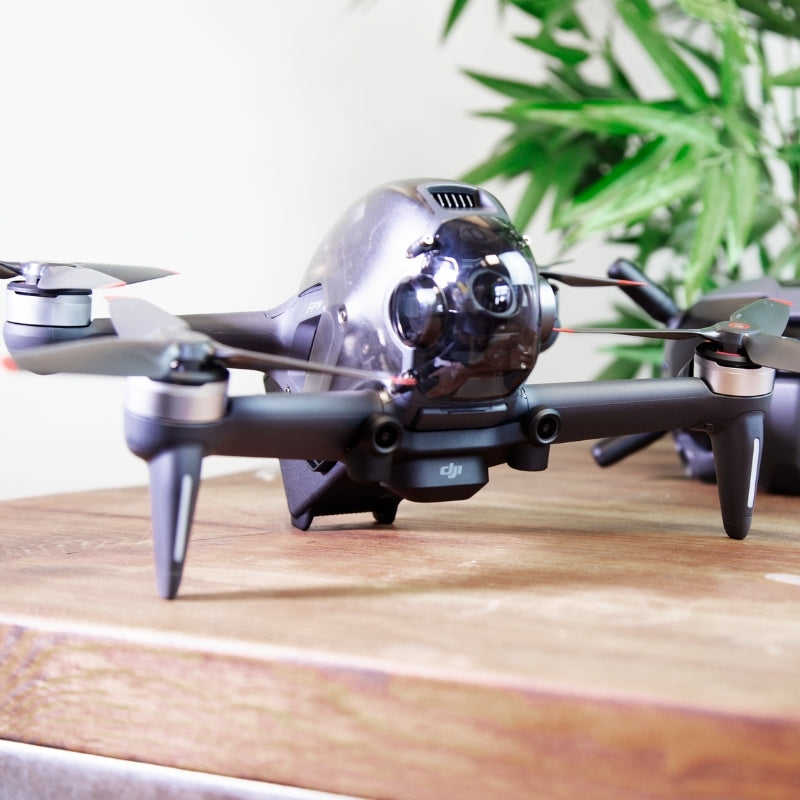
Updated on 8 Oct 2024
DJI FPV Drone Combo - Beginner's Guide, Set Up And Activation
Step-by-step guide to teach you how to set up and activate the DJI FPV Drone Combo .
The DJI FPV Drone Combo provides a high-octane and immersive flight experience.
This tutorial blog will teach you about setting up the FPV drone, goggles, and remote controller, and how to work the basic operating functions to get you in the air quickly and safely.
Want to know more about the DJI FPV drone? Then read our hands-on review. To find out more about the DJI Motion Controller, which can be used to control the drone with your hand movements, read our Guide To The Motion Controller.
How To Set Up The DJI FPV Drone
Open the microSD card cover and insert a microSD card.
Remove the gimbal cover.
Ensure the propellers are properly attached. Align the propeller on the motor, then press down and rotate to secure them.
Insert the battery into the battery compartment. Make sure it is secured in place.
How To Set Up The DJI FPV Goggles V2
The front of the DJI FPV Goggles V2 has four replaceable antennas to ensure optimum signal receiving and communication. Ensure the antennas are properly tightened before flying.
On the upper right side of the goggles you will find the Shutter/Record button, Back button, and 5D button.
Toggle the 5D button to scroll through the menu and press to confirm a selection.
Toggle up to go back, and toggle down to move to the next option. Toggle right to shift menu options right, toggle left to shift menu options left.
On the right side of the goggles you will find a Link button, Power Port, and Audio Port.
The microSD card slot and USB-C port are on the left side. The USB-C port can be used to connect with smartphones via the OTG cable (included in the accessory box).
On the bottom of the goggles you will find the IPD slider. You can adjust the interpupillary distance by moving the slider left or right. You can also purchase and install DJI FPV Goggles Corrective Lenses according to your visual needs.
How To Set Up The DJI FPV Remote Controller 2
The DJI FPV Remote Controller 2 has a USB-C port in the middle that can be used for charging, or to connect to a computer for firmware updates.
Control stick slots are located on both sides of the remote controller.
On the front side of the remote controller you can find the customisable C1 button, Lanyard Attachment, and Power Button.
Press the power button once to check the battery level. Press once and then hold for two seconds to power the remote controller on or off.
The antenna is located on the top of the remote controller. Unfold the antenna during flight for optimum signal transmission.
You will find the Flight Pause/RTH button, Flight Mode Switch, and Gimbal Dial on the left side.
Press the Flight Pause/RTH button once while flying and the drone will stop and hover in place. Press the button and hold for two seconds and the drone will automatically return to home.
The Flight Mode Switch button supports three modes: N (normal) Mode, S (sport) Mode, and M (manual) Mode.
Toggle the Gimbal Dial to the left and right to adjust the gimbal pitch.
At the top of the controller you will find the customisable C2 Switch, Shutter/Record button, and Start/Stop button.
The C2 Switch is set to control gimbal movements by default.
You can also customise this button’s function by going to Setting->Control->Remote Controller on the goggles interface.
Press the Shutter/Record button once to take a photo or to start or stop recording.
How To Download And Use The DJI Fly App
The DJI Fly app provides a live view of the aircraft camera, allows you to playback and download footage, and provides quick and easy firmware updates.
Download the DJI Fly app by scanning the QR code on the DJI Fly download page of the official DJI website.
You can also download DJI Fly on your mobile device's app store.
Make sure the goggles, remote controller, and the aircraft are all powered on and make sure all devices are linked successfully. Items in the Combo are linked automatically, but to read about linking, read our DJI FPV linking tutorial.
Connect your mobile device to the goggles via the OTG cable and data cable.
Launch the DJI Fly app on your mobile device, tap GO FLY at the bottom right corner...
Enter Album at the bottom left of the DJI Fly app home screen to view footage captured by the aircraft camera. You can select and download the footage to your mobile device.
How To Activate The DJI FPV Drone
Before using the battery for the first time, connect it to the charger for at least one minute to complete activation.
Connect the goggles to the goggles battery.
Remove the gimbal cover as well as the protective film on the gimbal camera.
Press the aircraft power button once, then press and hold for two seconds to power on the aircraft.
Power on the goggles and remote controller the same way.
Connect the OTG cable via the USB-C port on the goggles and connect to your mobile device using a charging cable.
After successfully linking the aircraft, goggles, and remote controller, open the DJI Fly App and follow instructions to complete activation.
After activation, make sure you charge the intelligent flight battery, the remote controller, and the goggles battery.
How To Update The Firmware On The DJI FPV Drone And Combo
If one of the DJI FPV devices is not using the latest firmware, a prompt will appear in the top left corner of the DJI Fly app to remind users to update.
Tap the prompt and the firmware will be updated automatically.
You can also connect the device to a computer and update the firmware using DJI Assistant 2 (DJI FPV series).
A complete update requires connecting the goggles, remote controller, and aircraft respectively to the computer.
DJI FPV Drone: Pre-flight Set-up
For your first flight, we recommend choosing an open and unobstructed area.
Check the battery level and place the drone on level ground. Remember, the drone should be facing outward with the rear side facing you.
Power on the drone.
Check the battery level of the remote controller and power on.
Set the remote controller to N Mode before takeoff.
Check the battery level of the goggles, and power on.
Adjust the headband and interpupillary distance for a clear, comfortable display.
Check the screen interface and make sure no errors occur and GPS signal is sufficient. When you're good to go, power on the motors of the drone by pushing the control sticks down and inward, then push the left stick up to ascend.
The RTH (Return to Home point) will be set after takeoff. Please remember the position of your home point.
DJI FPV Drone: Flight Modes and Basic Operation
Ensure the drone, goggles, and remote controller are linked before using the DJI FPV Combo.
N Mode
Ideal for new users, N Mode offers immersive flight with traditional drone flight controls along with DJI safety features like obstacle sensing.
In N Mode, use the left control stick to adjust flight height and heading. Use the right control stick to fly the drone forward, backward, left, and right.
When pushing the right stick to fly forward you can also push the left stick to the left or right for turning with customisable roll-angle limits.
In N Mode, the drone will only slow down when obstacles are detected. It will not stop and hover automatically. You will need to manually control the drone to stop or to bypass detected obstacles.
S Mode
Hybrid flight mode combining the freedom of flying manually with the simplified controls of previous DJI drones.
After switching to S Mode, control logic will remain the same but the drone’s maximum flight speed will increase to 27 m/s. In S mode, obstacle sensing is disabled.
S Mode also supports Cruise Control. Press the Start/Stop button to enter Cruise Control - 'Cruise Control Enabled'. Press again to exit - 'Cruise Control Disabled'.
Once Cruise Control is enabled, the drone will fly forward at a constant speed without any control stick movements. But you can also move the right control stick forward or backward to accelerate or decelerate.
M Mode
Fly in M (Manual) Mode for complete, limitless control and the full FPV flight experience. Customise parameters and enjoy flight and footage unlike anything else. Experience speeds in excess of 80mph.
Press the 5D button of the goggles and enter the main menu, go to Setting > Control > Remote Controller > Button Customization > Custom Mode, and set to Manual mode.
Open the rubber cover on the back of the remote controller behind the throttle stick and adjust the F1 and F2 screws with the screwdriver that comes in the box.
Tighten the F1 screw to stop the control stick from auto recentering and increase its resistance.
Tighten the F2 screw to reduce the resistance of the throttle stick.
For users interested in M Mode flight, make sure you have watched the M Mode tutorial before flying...
If an emergency occurs or you experience loss of orientation or control during flight in any mode, simply press the Flight Pause/RTH button and the drone will stop and hover in place.
Return to Home and Landing
Press and hold the Flight Pause/RTH button to make the drone automatically return to home.
When returning to home, set the drone to N Mode and always keep an eye on the Home Point shown on screen.
You can press the Flight Pause/RTH button again to cancel Return to Home.
To avoid any burns caused by overheating, do not detach the propellers immediately after landing.
Safety Precautions
If the drone is lost during flight but the camera view is still available go to the Find My Drone page and try to locate it on the map using the camera view along with flashes and beeps from the drone.
If the camera view is not available you can locate your drone by comparing the coordinates on the Find My Drone page with the coordinates in your last flight log.

written by
James Willoughby
James joined heliguy™ in 2018 following a 13-year stint in print and online journalism, having worked on regional and weekly newspaper titles. He is responsible for spearheading heliguy™'s content strategy and social media delivery. James collaborates with DJI Enterprise's European marketing team to coordinate and produce case studies and helps organise events and webinars.